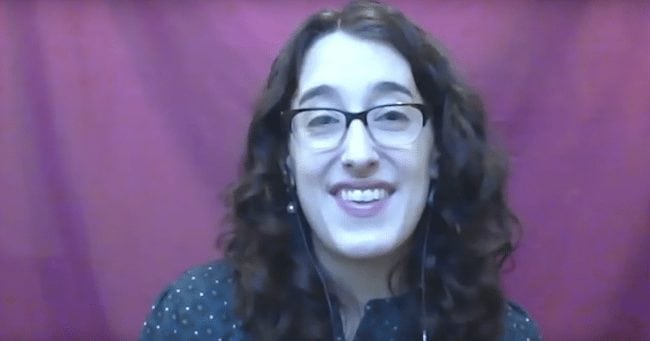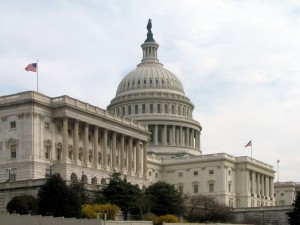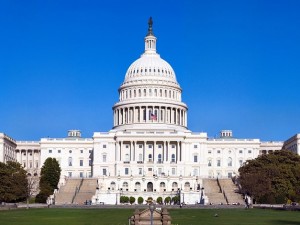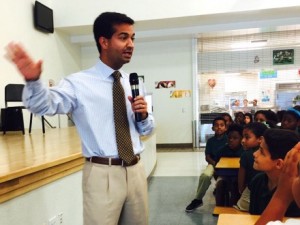Bipartisanship improves public opinion of legislators & policy
By Flannery Winchester
Each month, Citizens’ Climate Lobby hosts an online meeting featuring a guest speaker to educate listeners on topics related to climate change and our Carbon Fee and Dividend proposal. Check out recaps of past speakers here.
Our guest speaker for February 2018 was Dr. Celia Paris, an Assistant Professor of Political Science at Loyola University. She joined our February call to discuss the ABCs of Madisonian political ideals: Accomplishment, bipartisanship and civility. Dr. Paris is currently working on a book arguing that the public still truly values these ABCs.
Is bipartisanship an advantage in a polarized political climate?
“I started my research focused on this question: Does the public care about bipartisanship and cooperation across the aisle in Congress?” Dr. Paris said. We tend to assume that, yes, people love bipartisanship and want to see more of our elected officials working together. In fact, when you poll people with the question “What should elected officials do?” 68% of them respond that they should “try to cooperate across party lines.” A full 93% say elected officials should “treat opponents with more civility.” And 65% say they should “compromise to find solutions.”
Despite this clear appetite for respectful bipartisan engagement, Dr. Paris said, “That’s really not what we see happening in politics. We sort of see the opposite of that.” Politics is more polarized than in decades, and we regularly see humiliating attacks among legislators and attempts to undermine the legislative process for partisan advantages. In this climate, could bipartisan efforts actually backfire?
Ambiguity on public preference
“Part of the reason why this is even a question is that for many legislators, and for many of us, it’s kind of ambiguous what the public wants,” Dr. Paris explained. National polls may not necessarily hold true at the district level, and district-level polls themselves are rare and may be less reliable. Dr. Paris gave the example of the 2016 election, where the national poll numbers turned out to be pretty accurate, but state-level polling did not accurately reflect the outcomes.
One other challenge with polling is some factors that influence people’s answers. The concept of “social desirability” means that people may be more inclined to give an “acceptable” answer than a true one, like “Yes, I voted in the last election” even if they didn’t. Small changes in the wording of survey questions may also affect results, especially when you’re polling on complicated policies.
Clarifying what the public wants
In the face of all of this ambiguity, Dr. Paris said, “It’s really important that we think carefully about how we can clarify what the public actually wants.” She offered two key lessons from public opinion research.
First, she said, “When Congress is debating a bill, people are going to use cues to decide how they feel.” Those cues are shortcuts people use to help them decide which policies to support. “People are busy, they have a lot going on,” Dr. Paris acknowledged. So instead of deeply exploring policy details themselves, they will often follow the “cue” of their party’s position or the positions taken by politicians. People’s pre-existing attitudes toward certain policies do matter, Dr. Paris said, as does clear policy information, but “once a political debate starts about a specific bill, the cues still matter a lot.”
Second, to know how people really feel about something, we can evaluate how they react to specific, real life examples. “When we look at those reactions, that gives us much better leverage on what’s actually going on with the public,” she said. Dr. Paris tested this in her own research with two artificial articles about imaginary bills being debated in Congress. The bills were about complex policy issues (unemployment and immigration) and the goal of the study was to see how people reacted to bipartisanship, and if bipartisanship influenced the outcome of a bill.
The results are in—bipartisanship works
“What I found through these studies is it really does matter if there’s a bipartisan coalition supporting a bill,” Dr. Paris said. “People have a lot more confidence in Congress when that bill has bipartisan sponsorship—they like Congress better as an institution.” Dr. Paris also found that a bill is perceived as ideologically similar whether it’s bipartisan or sponsored by one’s own party. (That’s a big contrast from a bill sponsored by the other party, which gets less support and is seen as more ideologically extreme.) “People assume that bills sponsored only by the opposite party are bad,” Dr. Paris explained.
This bipartisan bump also extends to people’s perceptions of legislators themselves. “Opposite-party voters like the legislator better when he engages in bipartisan cooperation, and voters from the same party are fine with it—there’s no penalty there,” Dr. Paris said. The legislator is viewed as listening to the views of voters and to other representatives, and they’re sometimes even viewed as less self-interested. One exception to this trend is that minority voters were more skeptical of legislators working on bipartisan immigration bills, Dr. Paris pointed out, but on a broad-based bill like Carbon Fee and Dividend, she doesn’t expect any negative response from same-party voters.
Dr. Paris said the final takeaway is this: “Bipartisanship really benefits a legislator’s reputation and it also increases public support for the policy that is getting bipartisan support.” She encouraged CCL volunteers to highlight those benefits with members of Congress when inviting them to join the Climate Solutions Caucus. In addition to improving their own reputation, joining the caucus sends strong cues to their constituents that reinforce public recognition of climate change and increase support for solutions. Dr. Paris said, “Legislators should be aware that they’re helping themselves by engaging in a bipartisan caucus like this, and they’re also helping the cause. They should feel good about what they’re doing.”
Hear Dr. Paris’s full remarks on our February 2018 podcast or watch the monthly call on YouTube.





